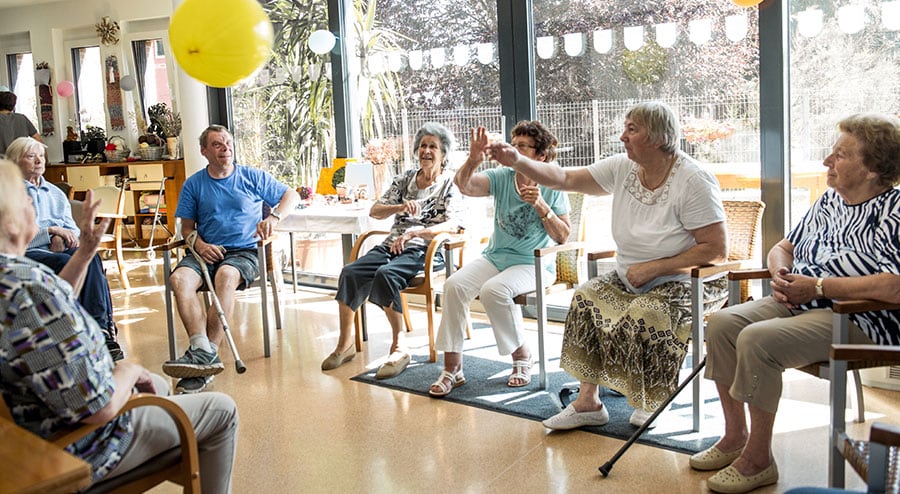Trusted Memory Care homes providing constant support and security.
Exactly How Assisted Living Facilities Enhance Lifestyle for Those With Mental deterioration
The assimilation of engaging programs and household participation better improves the residents' experience. The intricacies of mental deterioration care proceed to evolve, motivating a better assessment of how these centers adapt and introduce to fulfill the difficulties encountered by locals and their households.
Personalized Treatment Plans
(Dementia Care Charlotte)Oftentimes, individuals with mental deterioration require tailored assistance that addresses their unique demands and choices. Customized treatment plans are essential in assisted living settings, as they make certain that each resident receives appropriate interest and services. These strategies are established collaboratively, entailing healthcare experts, caregivers, and member of the family to develop a detailed review of the individual's medical history, cognitive capabilities, and personal passions.
A well-structured customized treatment plan typically includes certain goals associated with wellness administration, everyday activities, and social interaction. It represents the individual's cognitive decrease while advertising independence and dignity. Regular evaluations and updates to the treatment plan are important, as they permit for alterations based upon the resident's advancing condition and preferences.
Key components of these plans often entail medicine administration, behavioral support approaches, and nutritional guidelines tailored to the person's needs (Memory Care). By concentrating on individualized care, aided living centers can foster a helpful setting that enhances the lifestyle for people with dementia, inevitably adding to their overall health and happiness. This personalized method values the uniqueness of each citizen, ensuring they obtain the compassionate care they call for

Engaging Tasks and Programs
Engaging homeowners in purposeful tasks and programs is crucial for improving the lifestyle for individuals with dementia. These activities not just supply satisfaction but likewise promote cognitive function and promote social communication, which can reduce sensations of isolation often experienced by homeowners.

Furthermore, tailored programs are vital in making certain that each homeowner's special choices and capacities are acknowledged. This tailored strategy motivates participation, improves self-confidence, and supplies a feeling of achievement.
Furthermore, routine assessments of locals' interests can aid staff customize and adjust activities to far better suit progressing demands. By focusing on appealing activities and programs, aided living centers can considerably improve the general experience and emotional health and wellness of individuals coping with mental deterioration.
Safe and Encouraging Setting
Developing a risk-free and supportive setting is necessary for individuals with dementia, as it straight affects their well-being and high quality of life. Assisted living facilities are made with details attributes that promote security while fostering a sense of safety and comfort. These atmospheres prioritize accessibility, with designs that reduce confusion and motivate freedom, enabling residents to navigate their environments extra quickly.
Safety measures, such as safe and secure entrances and leaves, avoid wandering and unauthorized gain access to, which are important factors to consider for individuals with dementia (Memory Care). Employee are trained to identify the unique demands of residents, giving customized assistance and supervision to ensure their safety and security. Additionally, the consolidation of relaxing shades and familiar objects can help in reducing stress and anxiety and disorientation, developing a much more soothing ambience.
Along with physical security, emotional support is extremely important. Facilities typically utilize personnel that are not just skilled in caregiving however likewise educated in compassion and communication, fostering trust fund and rapport with residents. This holistic approach adds to a nurturing setting where individuals really feel valued and understood, inevitably improving their total lifestyle.
Social Interaction and Community
An encouraging setting not just prioritizes security yet additionally cultivates chances for social communication and neighborhood involvement, which are vital for people he said with dementia. In assisted living centers, structured activities and public spaces encourage citizens to link with each other, reducing sensations of isolation usually experienced by those with cognitive impairments.
Social interaction plays a significant role in boosting emotional wellness and cognitive function (Memory Care). Engaging with peers in team activities such as games, arts and crafts, or workout not only boosts cognitive capacities however additionally supports a feeling of belonging. Facilities commonly arrange events that promote socializing, allowing locals to build partnerships and share experiences, which can be specifically beneficial for those with mental deterioration
Moreover, a lively community ambience can enhance the overall high quality of life for citizens. Team member are trained to promote communications and support citizens in forming meaningful connections. By creating a society of interaction, helped living facilities assist individuals with mental deterioration keep social abilities and enhance their mood, eventually adding to an extra satisfying life experience. This community-oriented method is crucial in managing the difficulties related to mental deterioration, promoting a feeling of purpose and connection for residents.
Family Members Participation and Support
Family members involvement is essential in sustaining people with dementia in assisted living settings. Actively engaging household participants not only gives emotional convenience to citizens but additionally promotes a feeling of belonging and continuity in their lives. When families take part in treatment planning and everyday tasks, they add useful understandings concerning the individual's choices, background, and requires, which can improve personalized treatment.
Furthermore, normal household visits can substantially boost the psychological well-being of homeowners, lowering feelings of seclusion and stress and anxiety. Relative can also assist in maintaining cognitive function by involving their loved ones in familiar conversations and tasks. This interaction reinforces individuality and assists locals feel valued and understood.

Final Thought
In conclusion, aided living centers significantly boost the top quality of life for individuals with mental deterioration via personalized care strategies, involving activities, and a secure atmosphere. Jointly, these elements produce an all natural method to care that addresses the unique requirements of people with mental deterioration, promoting overall well-being and self-respect.